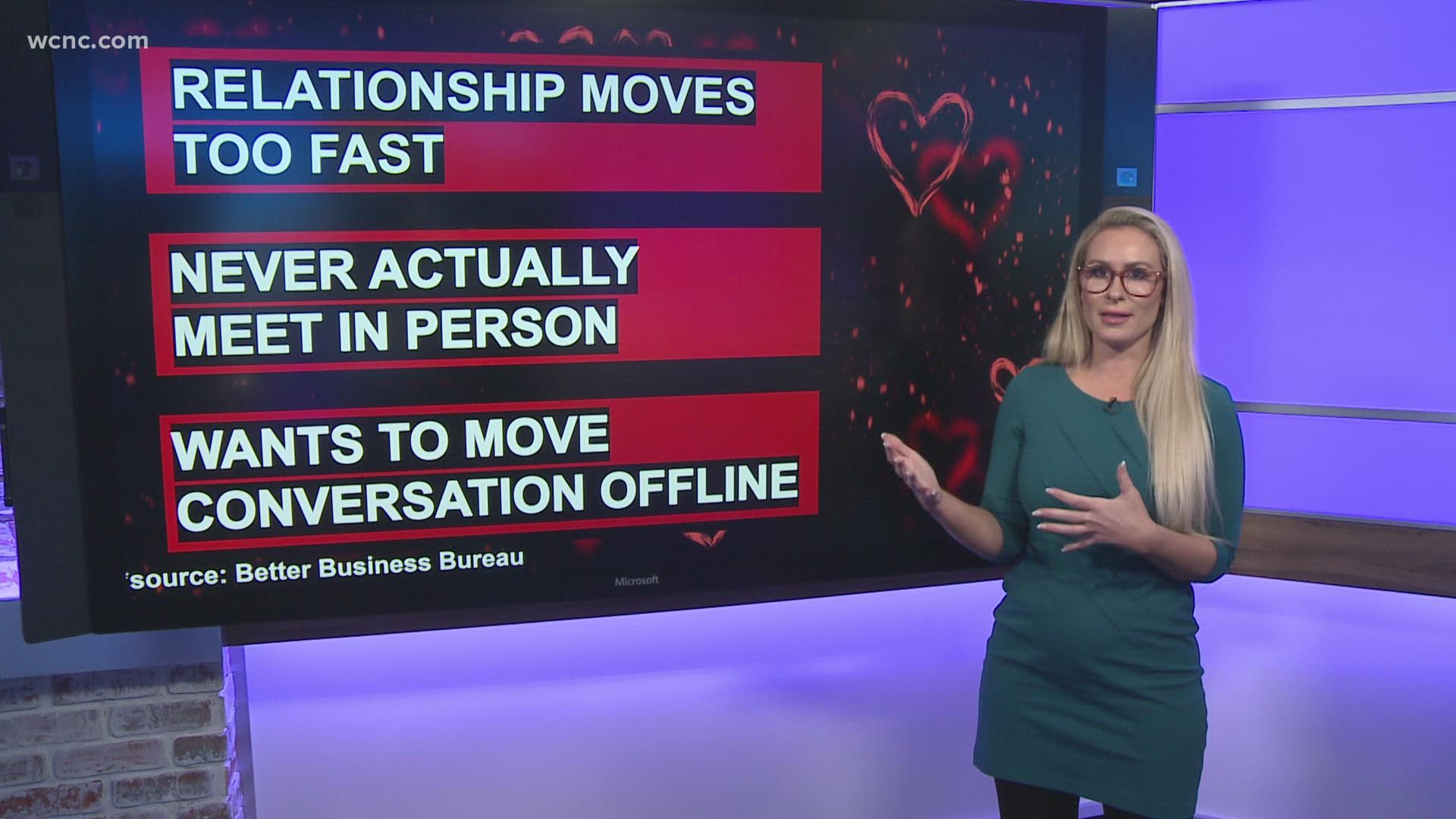CHARLOTTE, N.C. — Looking for love isn't easy.
Finding the real deal is even more difficult these days because of all of the scams. Experts say Valentine’s Day makes it that much worse because criminals know the holiday makes the lonely even lonelier and more vulnerable to scams.
According to the FBI, a romance scam is when a scammer creates a fake online identity to gain affection and trust. The scammer then uses the illusion of a romantic or close relationship to manipulate and/or steal from the victim.
Although this con may look like a classic romance scam, victims are tricked into illegal activity and can be prosecuted. In this instance, laundering money.
According to the Better Business Bureau, this is how the scam works :
You join a dating app and meet someone who could be considered the perfect person of your dreams. You both chat/text for a while and you may notice that they delete their dating profile.
Everything seems great, but soon your new beau has some unusual – but seemingly harmless – requests. They may ask you to receive money for them and wire it overseas.
They may even claim to be helping a loved one battling COVID-19, doing a business deal, or representing a charitable organization. If you refuse, your amorous new beau may suddenly get hostile, threaten you or grow distant.
It turns out that the money they want you to receive is actually stolen!
After stealing it, scammers send the money through someone in the United States or Canada to make it harder for authorities to trace.
This is called money laundering and wire fraud which are illegal. Sadly, even though the “money mule” is a victim too, they may still face prosecution.
Dr. Chris Pierson is the CEO of BLACKCLOAK, a cybersecurity company that protects high-profile figures from cyber-stalking, blackmail, hacking, spying, data theft and more.
Dr. Pierson said criminals running these romance scams via dating apps and websites won't ask their unsuspecting victim for a large sum of money, at least not the first time.
“You give them your $50, your $100. Then the next request is $300. Next is $500, all of a sudden, it's $1,000, that you're out and you know what? They're running that scam with 100, 200 people a week so it really does add up quite nicely for them,” Pierson said.
If a victim does fall for the scam, Pierson said there isn’t much that can be done to recoup the costs.
“It's not a credit card that you're supplying to them, it's going to be an actual right ACH or wire, or what we see a lot of is the financial apps in terms of, you know, actual just cash transfer apps being used. So, you know, once you get that dollar amount, and you multiply it times the number of victims that they're talking to, or potential victims, it turns out to be quite a lot of money that they're making,” Pierson said.
Here are some tips to help protect yourself from this scam:
Do your research:
- Many scammers steal photos from the internet to use in their dating profiles. Do a reverse image lookup using a website, like Google Images, to see if the photos on a profile are stolen from somewhere else.
- Search online for a profile name, email, or phone number to see what adds up and what doesn’t. Scammers most often pose as men and target women in their 50s and 60s.
Ask specific questions about details given in a profile:
- A scammer may stumble over remembering details or making a story fit.
Never send money or sensitive personal information to someone you’ve never met in person:
- Cut off contact if someone starts asking you for financial or personally identifiable information, like your credit card number or government ID numbers.
Be very suspicious of requests to wire money or use a prepaid debit card:
- These are scammers' favorite ways to send payments because, like cash, once the money is gone, it can’t be recovered.
Red flags to be aware of:
1) The online relationship moves fast.
Scam artists will try to build a connection with you, and quickly. You just “met” and they’re already professing their love and making plans for the future.
2) They want to move the conversation offline.
Scam artists want to get you off of the dating platform to instead get you to share your phone number. Communication will then happen via text or phone call free from the dating platform’s safeguards.
3) You never actually meet in person.
Scam artists will make every excuse as to why they can’t meet you in person. Some claim to be members of the military living overseas or working internationally all to make meeting face to face that much more difficult.
The biggest red flag of them all:
4) They ask for money.
This is the goal for the scam artist. Everything they’re doing up until the money request is to build trust and connection so when they ask for money, you’ll feel compelled to send it because you believe they’re actually interested in being in a relationship.
Carolyn Bruck: Contact Carolyn Bruck at cbruck@wcnc.com and follow her on Facebook, Twitter and Instagram.
Wake Up Charlotte To Go is a daily news and weather podcast you can listen to so you can start your day with the team at Wake Up Charlotte.
SUBSCRIBE: Apple Podcasts || Spotify || Stitcher || TuneIn || Google Podcasts
All of WCNC Charlotte's podcasts are free and available for both streaming and download. You can listen now on Android, iPhone, Amazon, and other internet-connected devices. Join us from North Carolina, South Carolina, or on the go anywhere.

